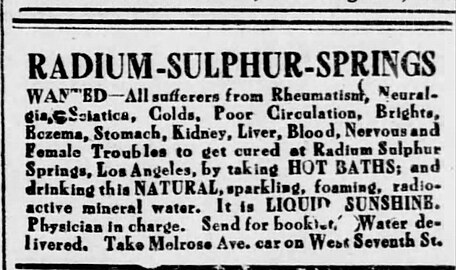Radium Sulphur Springs
History
In 1915, a U.S. government geologist reported that the spring's water temperature was 34 °C (93 °F) and that the water had measurable levels of calcium, carbonate, phosphate, magnesium, potassium, sodium, and sulfate. The same year, owners claimed the waters were "wonderfully curative" for diseases and disorders from catarrh to neurasthenia. The spring water was also bottled and sold for drinking.
The name changed to Hollywood Mineral Springs in 1924. In 1926, the street address was 5625 Melrose, near Larchmont, and the phone number was GLadstone 2149. Services offered 1928 included "mineral Roman tub, mineral steam, marathon bath, mineral colonic, mineral Scotch douche and massage by a graduate. Baths open from 9 a.m. to 11 p.m." The spa endured until around 1929 when the Great Depression and the death of the owner shut down the business.
The site reopened as California Mineral Springs briefly in the late 1950s. Circa 1968, the California Department of Water Resources reported that the spa was owned by Mr. Harold Brooks, and the source was an test well, probably drilled in 1905, and while the well had once flowed the "water level [has] declined below land surface and well is now is pumped". The well has reportedly been capped off.
Additional images
-
"Radium Sulphur Springs" (Imperial Valley Press, June 7, 1912)
-
Radium Sulphur Springs - Melrose Ave. and Gower St., Los Angeles, Calif.
-
Edna Marion of Christie Comedies endorses Hollywood Mineral Water in January 1927
-
"Here's Good News!" (Valley Times, September 30, 1958)
See also
- Radioactive quackery
- Bimini Baths
- Tongva Sacred Springs
- South Hollywood–Sherman Line
- R (Los Angeles Railway)
- Salt Lake Oil Field – Oil field under Los Angeles, California, United States
References
- ^ "Hotel at City's Edge". The Los Angeles Times. November 28, 1909. p. 88. Retrieved 2023-11-01.
- ^ Morrison, Patt (December 28, 2021). "From sacred to profane: A brief history of Southern California's hot springs". Los Angeles Times. Retrieved 2023-11-01.
- ^ Waring, Gerald Ashley (January 1915). Springs of California. Water-Supply Paper no. 338–339 (Department of the Interior, United States Geological Survey Water-Supply Papers). Washington, D.C.: U.S. Government Printing Office. pp. 71–72. Retrieved 2023-11-01 – via HathiTrust.
- ^ "Radium Sulphur Spring". Los Angeles Evening Express. March 9, 1909. p. 2. Retrieved 2023-11-01.
- ^ "Radium Sulphur Springs". Los Angeles Evening Post-Record. February 27, 1915. p. 13. Retrieved 2023-11-01.
- ^ "You don't need to be fat!". The Los Angeles Times. October 17, 1926. p. 78. Retrieved 2023-11-01.
- ^ "Drink from the Fountain of Youth". The Los Angeles Times. November 4, 1928. p. 133. Retrieved 2023-11-01.
- ^ "Los Angeles Evening Express 08 Oct 1929, page 31". Newspapers.com. Retrieved 2023-11-01.
- ^ "Hotel Owner Dies". The Los Angeles Times. October 7, 1929. p. 36. Retrieved 2023-11-01.
- ^ "Here's Good News". Valley Times. September 30, 1958. p. 6. Retrieved 2023-11-01.
- ^ Berkstresser Jr., C.F. (1968). Data for springs in the southern coast, transverse, and peninsular ranges of California. Department of Water Resources. Menlo Park, Calif.: U.S. Dept. of the Interior, Geological Survey, Water Resources Division. p. 29. Retrieved 2023-11-11 – via HathiTrust.
- ^ Moen, Rick (2016). "California Hot Springs - A Selfish Guide". Retrieved 2023-11-09.
External links
- Waldie, D.J. (December 31, 2013). "Hot Town: Los Angeles in the 'Radium Age'". PBS SoCal.



